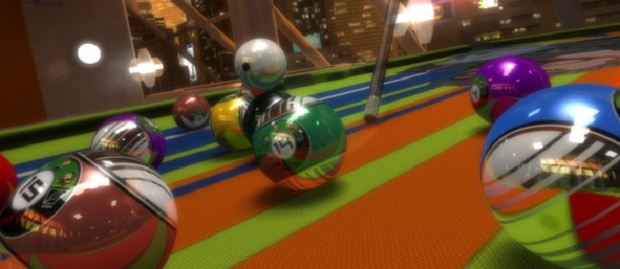Wot I Think: Pool Nation
Cue-to-ball
When Pool Nation appeared on Steam a few weeks ago, I was keen to try it but haven’t had time until the week just gone. I’d heard good things from friends who’d played on previous generation consoles, and I’ve been a fan of chalking my cue since developing an unexpected obsession with Jimmy White’s Whirlwind Snooker back in the days before I was old enough to squander my fifty pence coins at a table in the local boozer. I didn't expect to find myself playing the career mode in the small hours of the morning, or to care about perfecting my jump shot, but that's precisely what happened. Here's wot I think.
Recreating pool digitally seems like a fairly simple task, a case of creating decent physics wrapped in an attractive and robust engine. Within a small space, and tied to a strict and limited ruleset, there’s little flexibility or room for expression, but Cherry Pop have bolstered a solid simulation with enough extra features and modes to give the game a character of its own.
I started with a few singleplayer games, wanting to prepare myself before dipping even a toe into the shark-infested waters of multiplayer. My general approach to any multiplayer game is to assume that I will be terrible and hope to surprise myself. Usually, I wind up greeting defeat like an old friend and we have a good laugh about our misfortune before dissecting our performance.
This would be different though. I decided to work through every tutorial to get a grip on the controls and the range of possible shots. Within a few minutes, the game was nonchalantly suggesting that I chip the cue ball over an illegal ball and onto the cushion at just the right angle so that it deflected onto the intended target. Even with an ‘aim assist’ line switched on, I felt like I was under pressure and Failure crept into the room to give me a supportive shoulder massage.
I’m not often intimidated by tutorials but I didn’t fancy my prospects in a competitive match if this sort of ball-juggling was to be expected. A few ricocheting clangers later, I’d dented the floor, scuffed my cue against the felt a few times, but I was better able to gauge the strength of a strike and the angle of attack.
As far as controls go, I started with mouse and keyboard, switched to a controller, and finally returned to the original setup. I use the default setting of four for mouse control, holding the left button to begin a shot, using other buttons for adjustments and fine tuning, and the movement of the mouse itself to perform the cue action.
The game’s generous variety of modes includes a singleplayer career and that was my first port of call as soon as I’d mastered the tutorials. I needn’t have worried. The early opponents are accident prone and progress was rapid. Working through the ranks unlocks decals, cues, tables and other customisation options, as well as introducing different kinds of challenge, and the difficulty curve has a comfortable gradient. After a while, I was starting to wonder when the trickier tutorial lessons would come into play.
Elsewhere, is the answer. While AI opponents later in the game might require some obscure hops, jumps and swerves, it’s during multiplayer games that trick shots are most useful. It’s not always enough to defeat another player, sometimes it is appropriate to showboat. Admittedly, my showboats tend to go the way of the Titanic, clattering from cushion to cushion or cracking a ball from above and converting it into a dangerous projectile as it flies off the table.
That’s all part of the fun though – daring somebody to call a seemingly impossible shot is far more entertaining when there’s no risk of an errant tip tearing a wound into a pricey Simonis cloth. I’ve only just graduated to playing without aim assists and that’s caused me to revert to anxious angle adjustments. I spend more time on some of my shots than I do on a move during a Chess match, which makes the Endurance mode a pleasant respite.
Endurance is a timed challenge, in which the player must keep the table as clear as possible while new balls appear regularly. If there are 24 on the table at any time, the game ends, meaning shots must be quick and accurate. As well as providing an enjoyable challenge, it’s also encouraged me to resort to mouse control more often. There’s a strange similarity to FPS aiming, which usually requires greater precision than a thumbstick can offer, and my quickfire shots in Endurance also put the physics to the test.
Usually in a game of this sort, the most powerful short sends balls clicking and clacking around the table, allowing a haphazard approach to succeed from time to time. Here, balls aren’t attracted to the surface and simply slamming the cue ball from end to end often results in an aerial sphere and a distant crash as the room is inadvertently redecorated. Even when under pressure, carefully controlled shots are key to success. I can last about ten minutes. Some people can last for a couple of hours. Old friend Failure approaches once again.
Apart from Endurance, I’ve mainly played 8 Ball, but there are eight varieties of pool available, including 3 and 9 Ball, Speed and Killer. On top of that, a trick shot editor with loops, speed-up strips, ramps and other objects is due as DLC, as is a full snooker mode. The game already represents the best pool package I’ve ever played on a PC and I won't object to paying a Few quid for a decent snooker add-on, but the trick expansion will be entirely free.
Despite a fairly quiet launch on Steam, Pool Nation seems to have built a strong online community, partly due to the developer’s responsiveness. As well as helping to organise tournaments, Cherry Pop have added a unique prestige item for one group playing the game on its most difficult settings, a golden cue that is passed to the winner of each tournament. It’s good to see that level of attention and communication, and along with the planned expansions it provides reassurance that the game might have a long digital shelf life.
As I wrote at the beginning of these impressions, deciding between one pool game and the next could be quite difficult, and Pool Nation could win out simply through lack of competition. It’s a slickly designed game though, with two sizable single player career modes (8 and 9 Ball), strong and regularly improving multiplayer support, and more to come in the future. When it cropped up on Steam, I hoped it’d offer an experience at least comparable to Hustle Kings, which I’ve dabbled with on my PS3. I was pleased to find more options, more variety and a greater challenge, built around believable physics and a jolly good control scheme.
Yes, it's a pool game, and you could argue that there's not much more to say beyond that. But pool is a rare sight on the PC, unless it's of the top-down Flash variety, and this is a bloody good example of the form. 'Hole in one', as they say at the Crucible.












